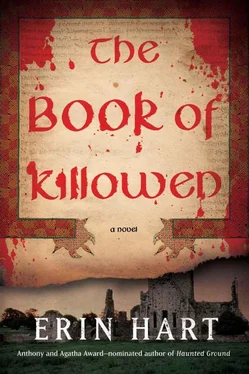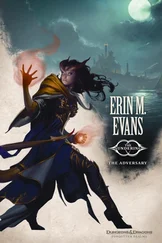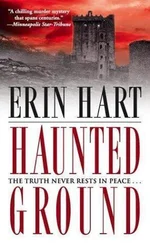“Please don’t get someone else. I will try harder. Please!”
Nora looked into the girl’s dark eyes, and something clicked. There was one advantage Eliana had over someone with more rehab experience, and it had just been demonstrated before her eyes. “You know, I’m not sure whether Cormac mentioned that his father lived in Chile for many years. He’s only recently come back to Ireland. It’s possible that English feels strange to him, especially after the stroke. It’s hard to know. But if you can understand him, I don’t know, maybe you could try doing the flash cards in Spanish.”
Eliana’s face brightened immediately. “I could do that, yes, let me try!” She went off in search of the cards, and Nora returned to Joseph and her laptop in the kitchen. She typed “oak gall” into the search box. The first entry that appeared was from a very old medical text:
Galls or gallnuts are a kind of preternatural and accidental tumour, produced by the Punctures of Insects on the Oaks of several Species; but those of the oak only are used in medicine. We have two kinds, the Oriental and the European galls: the Oriental are brought from Aleppo, of the bigness of a large nutmeg, with tubercles on their surface, of a very firm and solid texture, and a disagreeable, acerb, and astringent taste. The European galls are of the same size, with perfectly smooth surfaces: they are light, often spongy, and cavernous within, and always of a lax texture. They have a less austere taste, and are of much less value than the first sort, both in manufactures and medicine. The general history of galls is this: an insect of the fly kind, for the safety of her young, wounds the branches of the trees, and in the hole deposits her egg: the lacerated vessels of the tree discharging their contents form a tumour or woody case about the hole, where the egg is thus defended from all injuries. This tumor also serves for the food of the tender maggot, produced from the egg of the fly, which, as soon as it is perfect, and in its winged state, gnaws its way out, as appears from the hole found in the gall; and where no hole is seen on its surface, the maggot, or its remains, are sure to be found within, on breaking it. [See also: Serpent’s Egg .]
Nora stared at the last two words, her memory flashing back to Benedict Kavanagh’s distorted face and bulging eyes. The name—serpent’s egg—offered yet another meaning, altogether unforeseen. Filled with bitterness, the gallnuts were the imagined spawn of serpents. How many of these were forced into Benedict Kavanagh’s mouth—a half dozen? All at once she could taste the bitterness, the rancor, and the resentment contained in each one.
She thought of Kavanagh destroying a youthful Niall Dawson in that debate so many years ago, saw again in slow motion the scene from this morning: Kavanagh’s wife pulling the sheet from her husband’s body, such a primal, visceral reaction. Nora shook her head, trying to erase the memory of the expression on Kavanagh’s face, the bulging eyes and distended cheeks. She looked down at the gall in her hand once more, a chilling message from a vengeful killer.
There were a few more signs of life when Stella returned to Killowen in the late afternoon. With their morning chores out of the way, the farm’s residents were now pursuing their own work. Stella heard the tap-tap-tap of a chisel on stone as she rounded the corner of a small shed across the yard from the main house. Inside, wearing a leather apron and holding a hammer and chisel, was a fortyish man, his jaw elongated by a dark beard, his large blue eyes framed by shaggy brows and a floppy fringe of hair. His hands moved deftly as he chased a groove along a round stone into which he was carving a spiral design. One knuckle bled a bit where he had scraped it.
Stella waited until he’d finished before she spoke. “Excuse me, I wonder if I could have a word?”
He turned, unstartled by her presence, and began to lay down his tools as soon as she produced her Guards ID. “I expected you’d turn up sooner or later,” he said. “Saw the cars out on the bog yesterday.”
“Just routine questions,” Stella admitted. “I’m talking to everyone at Killowen, Mr.—”
“Lynch,” he said. “Diarmuid Lynch. What can I tell you?”
“Well, we’ve received confirmation that the second body in the boot was this man, Benedict Kavanagh.” Stella held up the photo of Kavanagh. “He and the car went missing about four months ago. So, for a start, did you know him?”
“No,” came the terse reply. Lynch barely glanced at the picture and instead picked up a rag from the bench beside him and began to wipe the stone dust from his tools, moving slowly and deliberately, replacing each in turn.
“How long have you been here, at Killowen?”
“Eighteen months.”
“And before that?”
“Knocked about. I was living in Spain for a while.”
“Working?”
“At a vineyard for a time, then another farm. ‘General labor,’ I think they call it.”
“How did you come to this place?”
“When I came back after being in Spain, I didn’t really have a home to go to. My parents were dead, the farm sold. I’d no other family. So I did whatever work I could find. Spent a good bit of time sleeping rough. Just my good fortune to fall ill so near to this place. I have Martin Gwynne to thank, for finding me out on the bog. I was in pretty bad shape—pneumonia, they said. Martin brought me here, and they managed to nurse me back to health. I decided to stay on after that.”
“We’re trying to find out what Mairéad Broome’s husband, Benedict Kavanagh, might have been doing in this area at the time he was killed. Any thoughts?”
“I really couldn’t say. I never met the fella.”
“Can you tell me what sort of work you do here at the farm?”
“The same as everyone else: tilling, planting, cultivating, harvesting, the odd bit of construction—and my own work here, of course.” He gestured to the stone before him.
“You don’t happen to have experience operating heavy machinery?”
“We have a small loader that we use for moving stones like these and for building projects. I drive it sometimes, as do Martin and Claire and Anthony and Shawn. Never operated an excavator, if that’s what you wanted to know.” He calmly continued wiping his tools with a rag, checking their edges, replacing them on the bench.
“Do you remember anything unusual happening last April, anything at all out of the ordinary?”
“Well, we got the new heat in last April—had lashings of hot water for the first time. That was unusual. And that’s when Shawn Kearney—the archaeologist—came to stay with us, attending the excavation on the heating coils. She turned up a few interesting bits, as I recall. I really don’t remember much beyond that. Everything else was pretty normal.”
He finished with the tools and turned his gaze upon Stella once more. For some reason, she had a sudden urge to put his name through the system.
Martin Gwynne looked up at Stella Cusack as he worked the flaws in a sheet of parchment with a short, sharp knife, scraping away rough patches. “Ask away,” he said. “I hope you don’t mind if I keep working; this commission is due in a few days, and I’ve still a lot of work to do.” He set aside the knife and reached for a sheet of fine sandpaper, scouring in a circular motion.
Stella studied his hands at work, the fingers long and sensitive, the fingertips floating over the vellum’s pale surface. Gwynne saw her glance at the text he was working from, a formal commemoration of a wedding, no doubt suitable for framing. As if he’d been reading her thoughts, he said, “Yes, decidedly less elevated than transcribing the word of God, but the written word has lost some of its mystique in the modern world, I’m afraid. This is what pays the bills nowadays.”
Читать дальше












